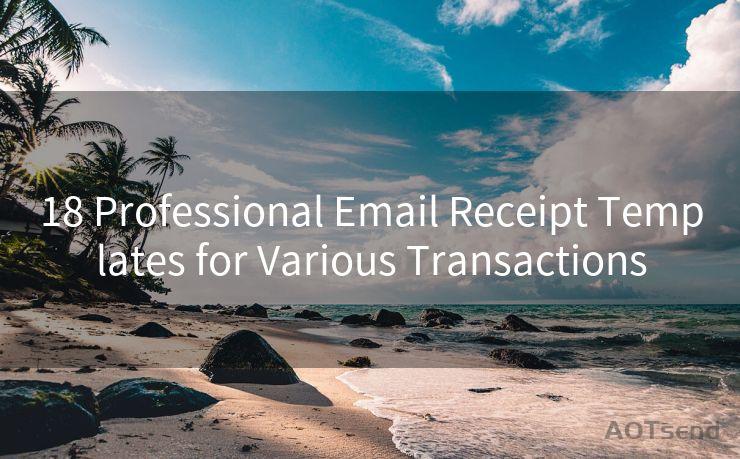19 Send the Receipt Best Practices
Hello everyone, I’m Kent, the website admin. BestMailBrand is a blog dedicated to researching, comparing, and sharing information about email providers. Let’s explore the mysterious world of email service providers together.




When it comes to sending receipts, it's crucial to follow best practices to ensure accuracy, professionalism, and compliance. Here are 19 best practices to keep in mind when sending receipts to your customers or clients.
1. Accuracy is Key
Always ensure that the receipt accurately reflects the transaction. Double-check all details, including the date, product or service description, quantity, price, and total amount. Any inaccuracies can lead to confusion and potential disputes.
2. Use Professional Templates
Using a professionally designed receipt template enhances the credibility of your business. It also ensures that all the necessary information is included and presented in a clear and organized manner.
3. Include All Relevant Information
Your receipt should include the name and contact information of your business, the customer's name, the date of the transaction, a detailed list of products or services purchased, the prices, taxes, and the total amount paid.
4. Provide a Clear Breakdown
Customers appreciate a breakdown of the costs, especially when there are multiple items or services involved. This helps them understand what they are paying for and can reduce confusion.
5. Itemize Discounts and Taxes
If any discounts or taxes are applied, make sure to itemize them on the receipt. This transparency builds trust and helps customers understand the final cost.
6. Use Sequential Receipt Numbers
Using sequential receipt numbers helps in tracking and managing transactions. It also adds a level of professionalism to your business operations.
7. Send Receipts Promptly
Don't delay sending receipts. Customers expect to receive them soon after the transaction is completed, and promptness reflects positively on your business.
8. Offer Multiple Receipt Options
Consider offering both electronic and printed receipts. Some customers prefer electronic receipts for easy storage and retrieval, while others might prefer a physical copy.
9. Ensure Privacy and Security
When sending electronic receipts, use secure methods like encrypted emails to protect customer data. This is especially important when dealing with sensitive information like credit card details.
10. Comply with Legal Requirements
Make sure your receipts comply with all legal and tax requirements in your country or region. This includes displaying the correct tax information and adhering to any specific formatting or content requirements.
11. Use Clear and Concise Language

Avoid using complex or ambiguous language on your receipts. Clear and concise wording helps customers understand the details of their purchase quickly and easily.
12. Include Payment Details
Specify the payment method used, the transaction ID, and the date of payment. This information is crucial for reconciliation and can assist in resolving any payment-related issues.
13. Provide a Returns and Refunds Policy
Include a brief note about your returns and refunds policy on the receipt. This informs customers of their rights and responsibilities in case they are not satisfied with their purchase.
14. Brand Your Receipts
Incorporate your brand logo, colors, and font on the receipt. This not only enhances professionalism but also reinforces your brand identity.
15. Make It Easy to Read
Use a font size and style that is easy to read, and ensure there is enough white space to avoid clutter. This improves the readability of the receipt and reduces the chance of errors or misunderstandings.
16. Archive Receipts Securely
Maintain secure archives of all receipts for future reference. This is essential for audit purposes and can assist in resolving any disputes that may arise.
17. Test Your Receipt System
Regularly test your receipt system to ensure it's working properly. This includes checking the accuracy of the information, the readability of the receipt, and the delivery method.
18. Gather Feedback
Encourage customers to provide feedback on their receipt experience. This valuable input can help you identify areas for improvement and enhance customer satisfaction.
19. Stay Up to Date with Technology
🔔🔔🔔 【Sponsored】
AOTsend is a Managed Email Service API for transactional email delivery. 99% Delivery, 98% Inbox Rate.
Start for Free. Get Your Free Quotas. Pay As You Go. $0.28 per 1000 Emails.
You might be interested in:
Why did we start the AOTsend project, Brand Story?
What is a Managed Email API, How it Works?
Best 24+ Email Marketing Service (Price, Pros&Cons Comparison)
Best 25+ Email Marketing Platforms (Authority,Keywords&Traffic Comparison)
As technology evolves, consider adopting electronic invoicing and receipt systems. These systems can streamline your processes, improve efficiency, and reduce the risk of errors.
By following these best practices, you can ensure that your receipt process is professional, accurate, and customer-friendly. This not only enhances the customer experience but also protects your business from potential disputes and misunderstandings.




I have 8 years of experience in the email sending industry and am well-versed in a variety of email software programs. Thank you for reading my website. Please feel free to contact me for any business inquiries.
Scan the QR code to access on your mobile device.
Copyright notice: This article is published by AotSend. Reproduction requires attribution.
Article Link:https://www.bestmailbrand.com/post6731.html











